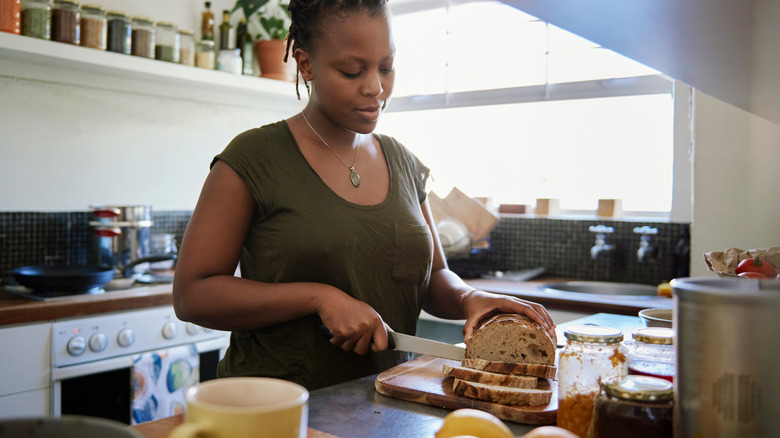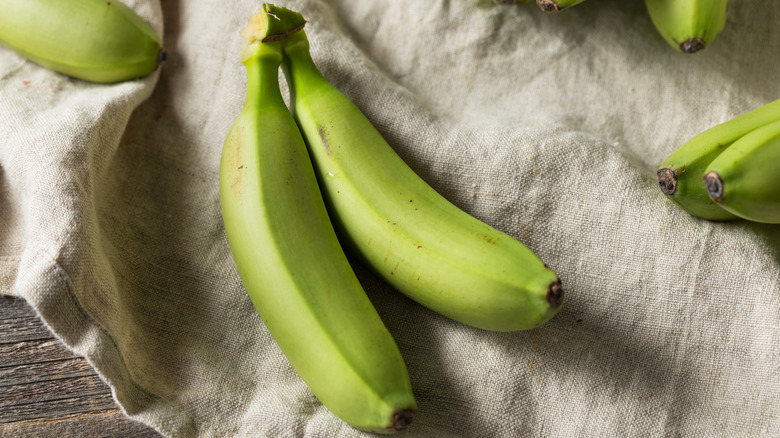The Best Carbohydrates To Eat For A Healthy Gut, According To Our Expert
When it comes to diet, carbohydrates are often immediately dismissed as unhealthy. Contrary to popular opinion, however, it turns out that we shouldn't be so quick to write off carbs. "We hear a lot of talk about carbs, but it's not as simple as the headlines make out," Dr. Scott Noorda, Longevity Physician at Resolve Utah, told Health Digest in an exclusive interview. Rather, carbs can be an asset to our gut health if we're strategic about what kinds of carbs we consume.
Dr. Noorda starts the interview by breaking down two types of carbohydrates: complex carbs and simple carbs. "Many people don't realize that there are, in fact, good carbs and not-so-good carbs," he says. "Complex carbohydrates that are rich in fiber and resistant starches provide essential nutrients to beneficial gut bacteria and are really important for health and longevity." On the other hand, it's pizza, baked goods, and white pasta that people often think of when they think of carbs. It's these types of carbs that can be detrimental to our gut health. "Simple carbohydrates can throw off the critical balance of good and bad bacteria in your digestive system, which can be the start of many health issues, including chronic diseases," Dr. Noorda states.
What types of carbohydrates are the best to eat to improve gut health?
Because simple carbohydrates can negatively impact our health, Dr. Noorda explains that complex carbs are the way to go. "Complex carbohydrates are the ones you want. They'll give you energy and boost your gut microbiome — which regulates many of the most important functions in your body, including your immune system and your hormones."
Dr. Noorda tells us that we want to reach for fiber-rich foods, in particular. "Dark leafy greens, broccoli, Brussels sprouts, artichokes, sweet potatoes, carrots, and beets all contain a lot of fiber," he says. "Fruits like raspberries, strawberries, pears, apples, oranges, and avocados also have a good amount of fiber." Legumes and whole grains are also great options, he adds, going on to highlight some of his own personal favorites. "Whole grains such as barley, oats (always organic!), quinoa, and whole ancient grains (einkorn, kamut, and spelt are my favorites) contain beta-glucan, a type of soluble fiber that helps improve gut health by promoting the growth of beneficial bacteria," Dr. Noorda explains.
Resistant starches are also great for gut health
"Resistant starches are a type of carbohydrate that move beyond the small intestine and ferment in the large intestine," Dr. Noorda tells Health Digest exclusively. "As they ferment, they become what is known as prebiotic — feeding the good bacteria in your gut." Leaving us feeling fuller longer, Dr. Noorda states that these types of carbs can help increase insulin sensitivity, lower blood sugar levels, and decrease appetite.
Giving us the inside scoop on resistant starches, Dr. Noorda shares some hacks for getting the most out of these foods. For starters, he suggests eating green bananas or adding them to your favorite smoothie recipe, although you may notice one unexpected side effect. Why eat unripened bananas? "Resistant starch decreases as bananas ripen," he explains before going on to share his second tip. "Soak cashews and raw oats overnight to make them easier to digest while still taking advantage of their resistant starch content." Dr. Noorda's third tip involves cooking methods for these carbs. "Cooking and cooling whole grains, rice, potatoes, and legumes like beans, lentils, and peas before eating is a great health hack that increases their resistant starch content. You can rewarm before serving," he states.
What are some easy ways to make sure you're incorporating healthy carbs into your diet?
To help ensure you're eating the healthiest carbs possible, use the rainbow as your guide, Dr. Noorda suggests. "Shoot for more color," he says. "The more (natural) color you have on your plate, the more likely you are to have healthy, fiber-rich carbs." This can include filling snacks like carrots with hummus or an apple with almond butter. For dinner, consider adding beans or cooked whole grains into a vegetable soup or into your lunchtime salad or wrap.
Dr. Noorda adds that we also want to be mindful of our simple carb intake. "Limit processed and packaged foods which are low in fiber and high in simple carbs," he says. Instead of white bread, for example, Dr. Noorda suggests opting for whole wheat bread, sprouted whole grain bread, or whole grain sourdough bread — all organic, ideally. When it comes to pasta, try swapping in vegetable pasta, bean pasta, or whole grain pasta in place of white pasta. Dr. Noorda's third and final swap suggestion is replacing white rice with brown rice, which will give us the fiber our body needs.
Connect with Dr. Scott Noorda on Instagram.




